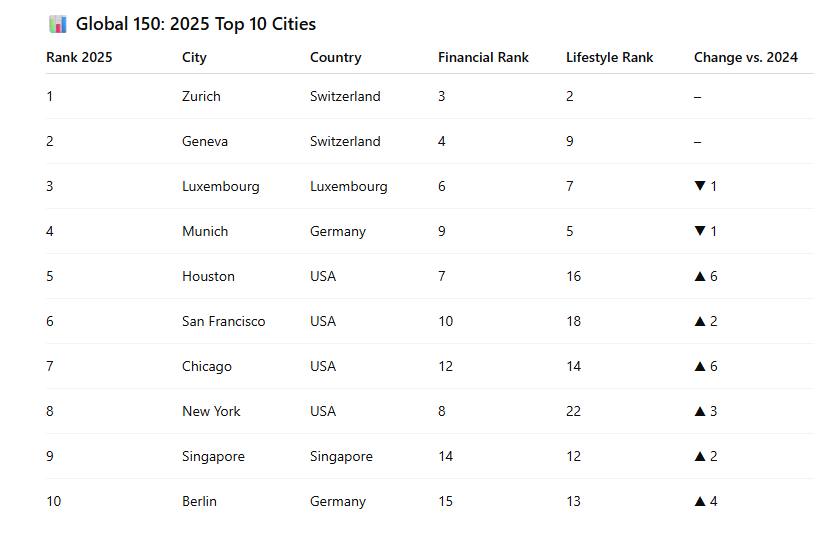AIRINC’s 2025 Global 150 Index, now in its seventh year, ranks 150 global cities by combining financial opportunity (salary levels, tax burden, cost of living) and quality of life. This makes it an ideal lens for employers and mobility teams balancing assignment planning and employee experience. It remains a go-to resource for mobility teams balancing economic efficiencies with employee experience.
Here are some of the key highlights from the 2025 Report:
- Houston surges into the global top five, climbing six places due to its low taxes and affordable cost of living. (Btw, checkout our latest Destination Spotlight webcast on Life in Houston!)
- Chicago re‑enters the top ten, also advancing six spots.
- Munich and Luxembourg swap positions within the top four—both seeing mild decline in financial scores.
- Tokyo experiences the steepest drop, falling 23 places owing to declines in cost and lifestyle metrics.
These shifts reflect broader economic dynamics—currency fluctuations, tax changes, inflation, and evolving lifestyle conditions.

Implications for Global Mobility Teams
As mobility professionals, these insights help shape strategic decisions—from assignment location selection to compensation structure and employee support strategies. Here's how:
- Reassess Location Appeal: Cities like Houston and Chicago are gaining ground as highly attractive assignment destinations. Their favorable cost and tax environments make them strong options for cost‑sensitive assignments—especially long‑term roles or those not dependent on premium lifestyle perks.
- Fine-tune Assignment Budgeting: With Munich and Luxembourg slipping slightly on financial metrics, mobility teams may need to re-evaluate cost structures, especially if these locations have been staples in your assignment portfolio. Stay vigilant about cost-of-living trends and tax changes that could alter compensation needs.
- Watch Lifestyle-driven Rankings: Tokyo’s sharp decline signals that economic attractiveness alone isn't enough—lifestyle changes matter. Rising housing costs, decreased amenity access, or lifestyle shifts might dampen an assignee’s experience. Prioritize holistic assessments beyond salary alone.
- Strategize With Agility: AIRINC recommends designing assignments and mobility policies with flexibility, allowing quick adaptation to economic shifts. Mobility programs that embed such agility—through dynamic allowances, policy review cadences, or hybrid assignment models—are better positioned to respond to trends like those reflected in the Global 150.
- Consider the employee experience: Mobility leaders can leverage the information to consider the types of support that may be needed when moving talent to these locations. Obviously locations lower on the list may require additional support from local, on the ground experts or cultural or language training support.
Explore the resource
The 2025 Global 150 Index highlights a shifting world—where cost, tax, and lifestyle landscapes are dynamically reshaping the global mobility calculus. Mobility teams that stay data-informed, agile, and outcome-focused can not only manage these changes smartly, but also drive real value for both the organization and assignee. Use this information to stay up-to-date on locations and aware of the pros and cons of them.


/Passle/56686a093d94740bd0dda608/SearchServiceImages/2026-02-10-16-26-33-438-698b5c39f64f040beedccf69.jpg)
/Passle/56686a093d94740bd0dda608/SearchServiceImages/2026-01-17-14-31-10-254-696b9d2edb51e5a032011e34.jpg)
/Passle/56686a093d94740bd0dda608/SearchServiceImages/2026-01-23-15-48-06-459-6973983631790aa068601e57.jpg)